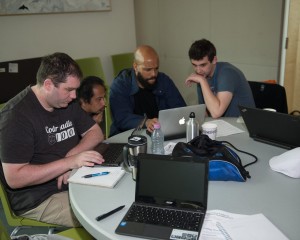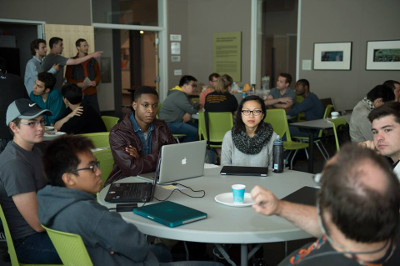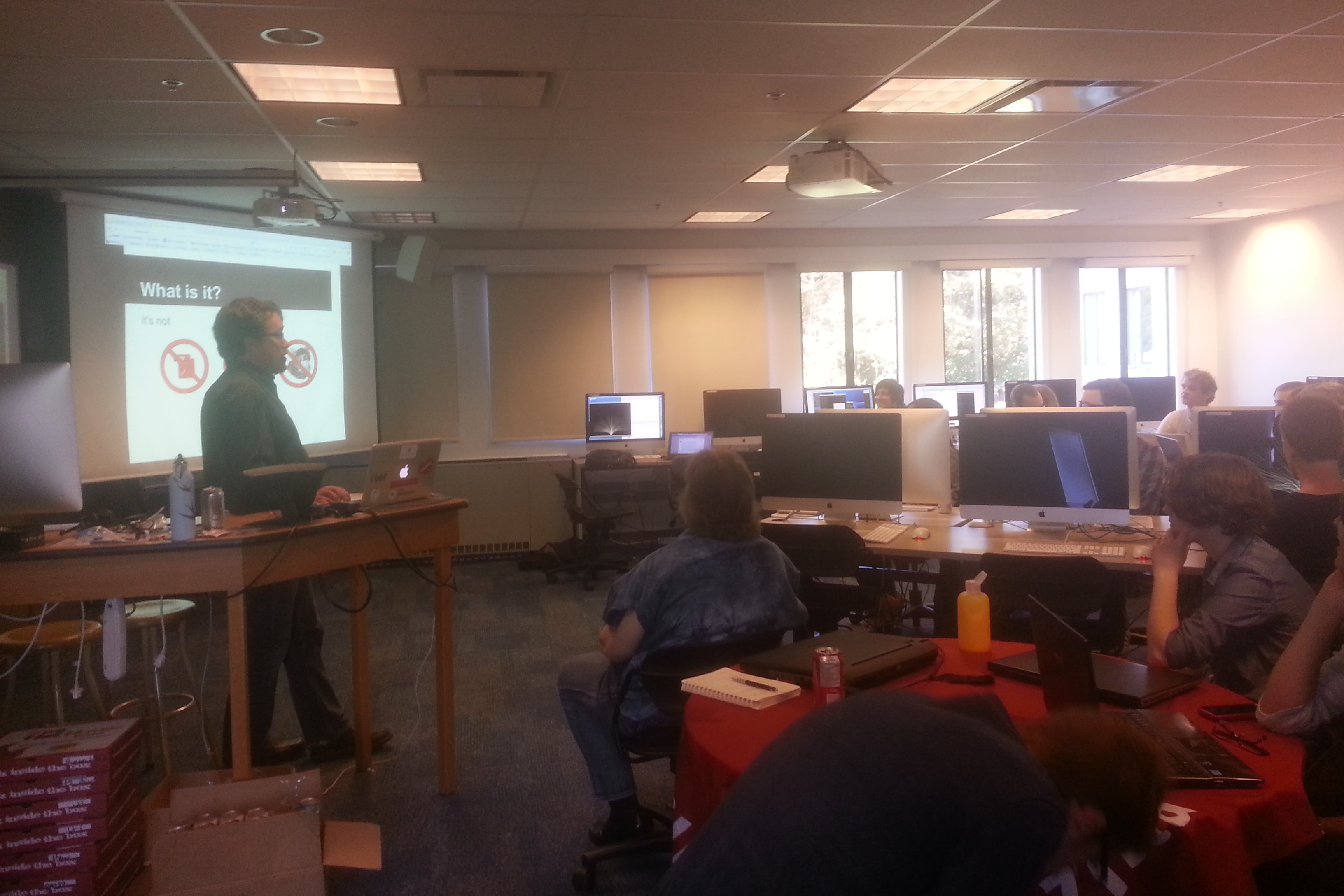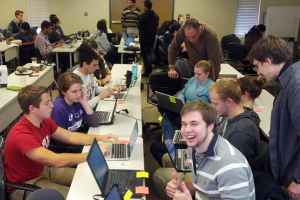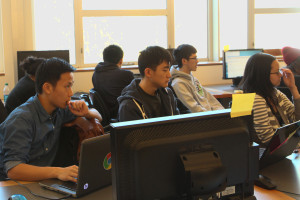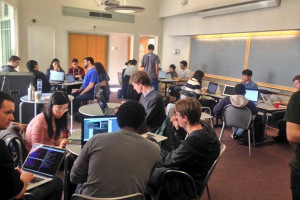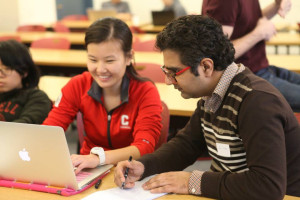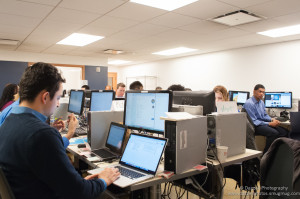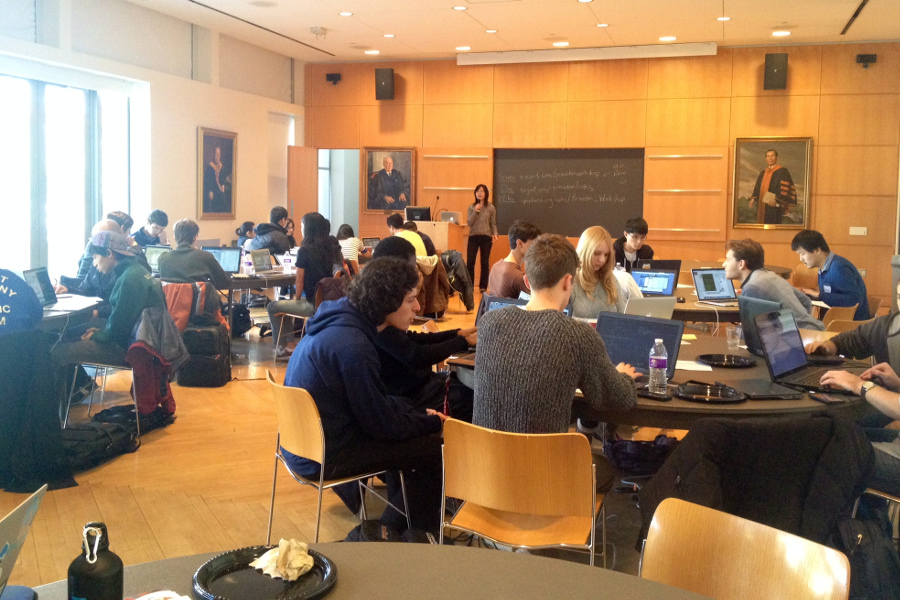Celebrating our successes and winding down as an organization
Today, with OpenHatch board members Mike Linksvayer and Deb Nicholson, I’m announcing that we’re winding down the organization.
Since 2009, thousands of people have been a part of, or been positively-impacted by, OpenHatch and our community. I’m proud of what we accomplished with so many enthusiastic volunteers and a small number of energetic paid staff at various times. Mike, Deb, and I haven’t been able to give OpenHatch the attention it needs to succeed over the past couple of years. We’re winding down the organization to acknowledge this truth.
To celebrate OpenHatch’s efforts, successes, and community, I’m throwing a party in Portland, OR, during this year’s PyCon! If you have fond memories of OpenHatch, I hope you’ll attend. At PyCon, over the years, we’ve run productive code sprints, seen inspiring talks, shared our own lessons-learned, and co-organized events to put our ideas into practice. The location is to-be-determined once I know how many people will attend. Please RSVP here and join me and others on Friday, May 19.
Looking back in gratitude
Of all the people involved in OpenHatch over the years, Shauna Gordon-McKeon deserves a special mention. In 2013, she took the lead role running the Open Source Comes to Campus event series, having first volunteered in 2012. Open Source Comes to Campus was the most successful thing OpenHatch did. There were 47 in-person events under her watch from 2013 through 2015, 13 of which were co-organized with women-in-computing groups. These events touched thousands of people in that time. I will be forever grateful for her tireless efforts and the incisive and optimistic way she questioned my assumptions.
I’m personally touched by all our enthusiastic fans and volunteers. You believed in us because we believed in you. OpenHatch has always been about empowering people to take control of technology. I am humbled by all the optimism, collaboration, inspiration that I’ve seen, and I know there’s so much more of it that I never got a chance to see. Thank you all for being so kind to each other.
If I can help you personally think about how to grow open source communities or diversity in free software, then drop me a line personally; I’ll happily volunteer time to help you, schedule permitting. I’m hopeful that this winding-down announcement will remind people of how much we can each achieve when we spend time growing the size and diversity of the the open source and free software community.
OpenHatch and the broader movement
OpenHatch was one part of a broader movement around improving diversity and inclusion in free software and software generally. As Mike, Deb, and I wind down this one organization, we’re heartened by those who push the movement forward. Three stories stand out in my memory.
In 2010 and 2011, Deb Nicholson and I agreed to organize the first Boston Python Workshop for women and their friends. The event came out of my desire to understand Railsbridge’s successes over 2009-2010 and translate it to Open Source Comes to Campus. Jessica McKellar, whom I met through the Twisted community, co-organized the event, and she quickly demonstrated that she deserved to run the event. In 2013, she became the PyCon Diversity Outreach Chair, where she still serves and delivers results that speak for themselves. Meanwhile, my talk about BPW at PyCon 2011 inspired Audrey Roy to found PyLadies. Today, PyLadies is an international mentorship organization with 64 locations all over the world.
In November 2014, Sean Lip volunteered at an Open Source Comes to Campus event at UC Berkeley. Toward the end of the event, students heard presentations from six open source projects. Sean presented Oppia, his open source project to host interactive online lessons for any topic, and I watched as nearly half the room volunteered to work with him. He told the room that he would make sure that every attendee could contribute usefully to his project, and I think this promise sealed the deal for many of his new volunteers. When he onboarded new contributors, he asked three key questions: What do you like about the Oppia project? What’s one skill you have? What’s one thing you want to get better at? I was impressed by how quickly Sean got to know his new contributors, and equally by his report that most of his new contributors were active volunteers many months later. I was impressed, so I did my best to incorporate these questions into a newcomer event at Debian’s yearly conference last year.
In 2015, Shauna Gordon-McKeon brought OpenHatch lessons back to PyCon by organizing an Introduction to Open Source & the PyCon Sprints. PyCon has always invited new people to join open source projects at the sprints. Historically, each participating project was responsible for onboarding its own newcomers. Shauna’s introductory event united newcomers with helpful volunteers independent of project, and it attracted nearly 100 attendees. The event has become a fixture at PyCon, and Shauna was able to deliver it again in 2016. At this year’s PyCon, Chalmer Lowe is delivering the introduction to the sprints; he attended Shauna’s event, and over the past year, he evolved it into a hands-on workshop.
I feel humbled to know that the organization’s vision and lessons live on in new ways, with new people.
What’s next for the organization
Given OpenHatch’s relative inactivity over the past two years, I believe that winding OpenHatch down is more efficient than performing a search for new board members. For me personally, I feel a need to focus less on free software and tech generally so I have more time for music, my own family connections, and non-software forms of political involvement. In the words of the Ubuntu Code of Conduct, my aim is to have the organization step down considerately.
Finances. Mike, Deb, and I are extraordinarily grateful for the donations and sponsorships that sustained our organization. We have come to the conclusion that the best use for our small amount of remaining money is to gracefully wind-down the organization, then donate the rest to Outreachy. Outreachy organizes diversity-seeking internships twice a year with a number of free software organizations, including 39 internships this summer alone. OpenHatch will cancel recurring donations effective today.
Programs. I’d love to find a new organizational home for Open Source Comes to Campus. If you’re interested, please send a two-sentence email to asheesh@asheesh.org with: (1) Your organization’s name or your name, and (2) What you see as a plausible accomplishment you might have in the first year of revived Open Source Comes to Campus. I’m hopeful that I can find the program a new life, share the lessons I’ve learned, and connect you with people who have run these events. Students still want to organize the events. For example, during April 2017, students City College of San Francisco worked to organize an open source comes to campus on their own, though they decided to defer it until the fall for now. You can step up to help groups like them.
Websites and software. OpenHatch has built and deployed a lot of software and websites, and I’d like to keep a copy online for as long as possible. The general strategy will be to move them to static website hosting, perhaps GitHub pages. I plan to do this myself, which may take me a few months. Specifically:
-
I’ll be working on disabling the dynamic features of the various OpenHatch websites. The code will continue to live on GitHub, but I’ll indicate that it’s not in active use. It’s already open source software.
-
I’ll snapshot all the dynamic websites, then retire them. I’ll aim to keep all content online or transition it to a new home with redirects. It might take a couple of months for me to get to everything.
-
As part of my decreased free software involvement, I am mostly retiring from IRC. I am looking for someone to be the owner of #openhatch for freenode’s records.
Finally, if you have any happy memories you want to send me, feel free to email them to asheesh@asheesh.org. I would be honored to read those stories at the party, and make a blog post collecting those stories, if you permit. If you need anything from me, I hope you’ll let me know. If I’ve forgotten some aspect of the wind-down and how it affects you, please drop me a line.
It’s been my honor to serve you all, learn from you, and work with all of you people reading this. Truly. I hope you’ll consider attending the party!
Asheesh Laroia.
Thanks to Britta Gustafson, Greg Price, Jim Garrison, Lisa Hewus Fresh, Mike Linksvayer, Nathan Yergler, Parker Phinney, Philip James, and Sumana Harihareswara for providing helpful feedback. Any errors are mine.
Tips, facts, thoughts after 3 successful semesters of OSCTC
Hey! I was a student at City College of San Francisco and made a post a few months ago thanking Open Hatch for their effort in enabling us put on our third epic Open Source Comes to Campus event.
With college being in recess for summer, I finally got to finish a summation on various experiences, thoughts and facts that I and my co-organizers had. I hope what’s below the cut will help future student organizers be prepared and current Open Hatch contributors become aware of what some student organizers are experiencing in the field.
Read the rest of this entry »
Finding the next OpenHatch board member
I’m Asheesh Laroia, OpenHatch’s founder, and a current board of directors members. We need a new board member, and I hope you (dear reader) might apply!
Why you would be a good board member
We are looking for someone who cares about making open source software an ever-more inclusive, diverse, powerful community, and is willing to spend time working on that goal in a very abstract way, through making sure our board has regular meetings, manages staff well, remains organized, sets and achieves fundraising targets, and stays in touch with our lawyer & accountant.
It is a combination of dry work with deadlines imposed by governments and a whole world of possibility opening up from the fundraising we do, to the volunteers we inspire, to the open source projects that benefit from this work. That’s the basics.
We’re hopeful you see yourself as organized, which is a trait that can help us all work together better.
We are especially hopeful you are willing to spend one or two hours a week working with our staff member, if/when we find a new one, as their manager, finding out how their projects are going, helping them set goals, and helping them achieve them. This isn’t essential, but it is a plus — please let us know if you find this interesting!
If you have new ideas about how OpenHatch could help grow the community beyond Open Source Comes to Campus and our current website, we would love to hear it. We’re open to fresh thoughts and ideas.
You don’t have to know anything about non-profit law/organizations when you start, but you have to be willing to learn the very basics.
About OpenHatch and the board
OpenHatch is a non-profit dedicated to matching prospective free software contributors with communities, tools, and education. (Did you know that OpenHatch was originally founded as a for-profit startup in 2009? Being a startup didn’t work out for us, and a new board created the non-profit.)
For the past four years, that has mostly meant working in person with student groups, helping them run Open Source Comes to Campus events — read more at http://campus.openhatch.org/. It has also meant fostering online learning and community-building through our website, https://openhatch.org. You can read more about current + past board members here: https://openhatch.org/wiki/About_OpenHatch
We’re seeking new board members because, after four years, one of our board members have retired. The esteemed Jessica McKellar has retired from the board after more than three years on it, creating a vacancy.
The board of directors (shorthand here: “board”) is responsible for building the organization that achieves this mission. As a whole, that means:
- Managing the budget and allocating funds.
- Raising those funds, from sponsors & individual donors.
- Maintaining OpenHatch’s status as a non-profit corporation (with help; we have a law firm & accounting firm).
- Having periodic meetings.
At OpenHatch’s size (0 to 2 staffers at any given time), one board member typically volunteers to manage the staff, too.
There are 5 seats on our board, with one vacant. Directors are elected annually for a term of one year. Directors need not be residents of the US, and they are not compensated for their work. Ask us for the OpenHatch bylaws for more complete info.
How to apply
Please send an email to:
boardsearch@openhatch.org
with the subject line of “Possibly joining the OpenHatch board” and at least two sentences explaining something you liked about this post.
We’re excited to meet you!
Deadline: Please email us by July 15!
Moving On
Back in February 2013, I ran my first Open Source Comes to Campus event. It was a snowy day with a small but enthusiastic turnout. At one point during the workshop at the end of the day, a student I was pairing with said something which has stuck with me ever since: “Today has been very empowering for me regarding my computer and the ways I can manipulate it.”
Two years and fifty events later, it’s time for me to move on from my role as Program Director at OpenHatch. This role has expanded over time to encompass not just event planning but curriculum building, conference presenting, sprint planning, guide writing, website making, mentoring, consulting and maintaining one of IRC’s friendliest bots. There’s no doubt about it: the last two years have been very empowering for me regarding the open source community and the ways I can contribute to it.
I’ll be wrapping up my work in the middle of May. I look forward to participating in the OpenHatch community as just another enthusiast and to continuing to work within the open source community.
Happy contributing, everyone. 🙂
Preparing for the PyCon Sprints
A year or so ago I wrote the In Person Event Handbook to help people prepare their projects for in-person events like workshops, hackathons, and sprints. With the PyCon 2015 sprints coming up, I thought I’d take a moment to write up the highlights. Want to make your project welcoming to newcomers? Read on!
Step 1: Articulate Your Goals & Expectations
Why are you participating in the sprint? What are you hoping to accomplish over the next few days? Are you hoping to expand your community? What are you happy to teach newcomers, and what would you prefer they already know?
One of the most useful things you can do is to think and talk about what your expectations are. For instance, if you only want newcomers who are proficient in python, that’s totally okay – but it’s important to say explicitly, so that beginning programs can find a sprinting project (like OpenHatch) where we’re happy to teach basic skills.
Knowing what you want to accomplish can help you pick tasks for newcomers to work on. One mistake I see people make is to say, “You can work on anything you want! We’re happy for any help.” That’s a great impulse, but it can be overwhelming for newcomers to choose from a wide variety of options. Follow up with: “That said, here are our highest priorities for the sprint. Would you like to work on this specific task?” (See more about picking specific tasks in Step 3.)
Step 2: Check Your Set Up Process
One of the biggest time-sucks at events – and in open source development, generally – is getting the development environment set up. It’s a chronic problem in large part because it’s really hard for maintainers to fix by themselves. They’ve already got the dependencies installed and the projects running on their systems. Unfortunately, it can take newcomers hours or even days to accomplish the same, especially if they’re developing on a different operating system than the one the maintainers are.
One way to tackle this problem is to recruit some newcomers and have them go through your setup process while you’re available in real time, via IRC, video chat, or in person. They should work from the already existing documentation. When they get stuck, you can help them identify the problem, and either you or they can file documentation and proccess issues in your tracker to be fixed before the upcoming event.
We call this a “setup sprint”. If you’re interested in doing one, let us know, and we’ll help you find newcomers to work with. Another option is to go through this process as the first activity at the event. It’s up to you!
Step 3: Gather Some Tasks Ahead of Time
It’s important to have a pre-selected list of tasks for newcomers to work on, rather than letting them loose on your issue tracker. When drawing up your list, we recommend the following:
- Include a variety of tasks, not just coding tasks. Consider adding documentation, design, publicity, and/or community management tasks. You may also have meta-tasks: for instance, you might like to have someone go through your issue tracker and flag issues that need to be reproduced. Or you might like to have someone reproduce some reported issues! These tasks can be difficult to capture in the issue tracker itself, so we encourage you to have a document elsewhere, for instance on a wiki or etherpad, that covers any tasks not on your issue tracker.
- For coding tasks, try to find tasks which are self-contained and don’t require intimate knowledge of your codebase. Where possible, add information to the issue about which files, functions, etc would be involved in the fix, so newcomers know where to start.
- Other information to add to issues includes:
– Clear explanations of what the current and desired behavior is. How will the contributor know that they’ve successfully addressed the issue?
– What skills or tools will be involved in fixing it. This will help contributors decide if it’s a good issue for them to tackle.
– Other changes they may need to make. Will they need to update the test suite? The documentation?
Some of this is information you might just tell newcomers at the event, but if you address it ahead of time you free yourself up to focus on more in depth mentorship, or to work on more issues yourself.
OpenHatch will be running an introductory workshop at 5:30pm on 4/12, which is the Sunday night before the PyCon Sprints. Please join us as either an attendee or a mentor!
Have additional questions or advice? We’d love to hear about them.
See you at PyCon!
Thank you, from City College of San Francisco
Recently, the Coders Club coordinated with Open Hatch to bring the awesome Open Source Comes to Campus event to City College of San Francisco. With the amazing Asheesh Laroia at the helm and awesome bay area mentors at his side, the eight hour long workshop ended with the attendee’s intrigued and eager for more.
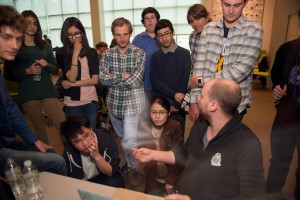
Photo taken by Alan Martinez. See more photos on the Coders Club Facebook page.
All of us were appreciative of what Open Hatch and the mentors had done for us and City College, and some of us were motivated to put together a thank you letter. Below you’ll find a poem and some quotes from the attendees about their experience that’ll hopefully make you feel warm and fuzzy inside.
Words are Not Enough
a poem for those who inspire us
Though our time together was short,
your impact is strong.
We were set in motion,
by your great notions.
Our minds grew twice the size,
and our smiles: the cheshire cat’s.
Our bright eyes
and eager determination
were given rise
by your foundation.
So thank you OpenHatch,
for brewing this batch;
a expertly crafted brew
of lesson plan and presentation
that affected this generation.
I don’t think anyone knew
just what each could do,
so lets take a pause
and for all of us:
applause
Here are what some of the student attendee’s said about the event.
“Before open hatch I had doubts about picking CS as a major or a minor or just continue learning it in general. After the event I have decided to study computer science in greater depth.
Mentors did an amazing job. They were patient and nice and answered pretty much every one of my stupid questions. It was very interesting and inspiring to listen to each story. All in all, I couldn’t have spend that Saturday better.”
– Siuzanna Arutiunova, City College of San Francisco Student
“I was talking with a mentor about my uncertainty on choosing the computer science major. The mentor was kind enough to let me meet her for lunch and see what she does as a programmer! Thanks OpenHatch for such an excellent opportunity!”
– OpenHatch Attendee and City College of San Francisco student.
“OpenHatch enabled me to make real more of what I want to see in my college: the importance and relevance of open source ideology, industry best practices for working on real open source projects and a fun, free and safe environment for beginners of any background.
Mentors: it would not be half of what it was without you!”
– Tyler Brothers, Coders Club member
So thanks again, Open Hatch and mentors. What you all do is special and means a lot to all of us.
Sincerely,
The Open Source Attendee’s,
CCSF Coders Club,
and City College of San Francisco.
How Did We Do? Part I

Goooals. Photo CC-BY-SA by Thomas Leth-Olsen.
A year ago I wrote a post titled ‘Goals for Open Source Comes to Campus in 2014’. This is the first of the promised posts – let’s review how well we met our goals, to help us better reach our goals for next year!
Goal #1: Increase the number of Open Source Comes to Campus events, and make them easier for others to run.
We wanted to grow our community by making our events easier to run, with less hands-on help from Asheesh and myself. I picked four concrete goals to help us measure that.
Number of events: We hope to double the number of Open Source Comes to Campus events, from 12 in 2013 to 24 in 2014.
Result: Exceeded! We ran 26 Open Source Comes to Campus events this year. You can see the full list here.
Feedback from events: For each event, we will elicit feedback in the form of surveys from students and mentors, and have debriefings with organizers. We hope to see a positive trend in the surveys. A positive trend would be an improvement of the average rating by 1 point or more (on a scale of 1-4).
Result: It turns out that it’s very hard to get people to fill out surveys. Across our 26 events, we collected 41 survey responses, which is unlikely to be a representative sample of our attendees, nor can it tell us much about trends. We’re still working on a way to get the sort of concrete feedback we’d like to have. If you’d like to get involved in that discussion, join us here.
Even if we had gotten a higher response rate, we’d have trouble measuring our success. Why? We didn’t ask for ratings of the overall event, only of the individual activities. Nor did we ask before and after questions using sign-ups. As a former research psychologist, I’m kind of embarrassed to be writing out this section.
But we did get some informal feedback. Let’s take a look.
We asked students to tell us their favorite and least favorite things about the event. Some sample responses (most people wanted to remain anonymous):
Favorite things:
“I loved being able to make my first contribution. I also thought the career panel was very informative.”
“My favorite thing was getting to make the small fixes in the first activity where we first learned how to use open source.”
“In our contributions workshop, we got the chance to talk to a data analyst about his work which was really cool!”
“I liked the in-depth tutorial on how to work on Github. I couldn’t figure it out on my own before.”
“Being able to contribute. Career panel. Just having someone around who I can ask questions.” ~ Chris Garry
“My favorite thing about the event was being able to speak to the mentors and gain insight from them. I enjoyed being able to speak to them and hearing their experiences. “
Least favorite things:
“There were not a lot of instructions going into the Contribution part. This makes sense to the extent that each project and bug have their particular niche, but it made for a challenging activity.”
“Not getting a broader introduction to the mentors. Maybe an online portfolio page for mentors so when we are done talking to couple of mentors, we can figure out what to do next since we might have forgotten what other mentors did by then.”
“I was a little frustrated with how long the workshop lasted. It was a lot of info.”
“It was somehow fast when we started with ‘git’ especially for newbie like me. But I’ve got help and everything went great.”
“My least favorite thing about the event is that I did not have much experience with the languages that the projects on github used, so it was difficult for me to try to find a way to contribute.”
And then, to end on a nicer note, some more favorite things:
“The workshop was a great introduction to an intimidating field. I learned a lot, and got to interact with many other talented developers. I enjoyed working with other people that were also new to open source software, and felt like I was actually making a difference.” ~ Armand Halbert
“I really enjoyed the contributions workshop, as it gave me both some technical insight into projects I’m interested in, and gave me some information on how to go about contributing to projects.”
“Get to know people, to know how to use githhub, basically everything was great.”
Hands-off events: We plan to run at least one event with minimal-to-no involvement on the part of OpenHatch organizers. We hope our surveys show that these events are just as successful as those we have a more active role in.
“Hands-off” turns out to be an ambiguous term. Predictably, repeat events tended to be more independent than first time events, but we ended up being somewhat involved in every single event. This is fine by us. Our goal is to empower others to run open source outreach events, not to never attend their events or offer advice.
The closest we got to satisfying these goals were likely our repeat events at the University of Minnesota Morris (September 13th) and City College of San Francisco (March 22nd, September 13th). Experienced and highly capable local organizers Elena Machkasova (Morris) and Katherine Moloney (CCSF), along with new student organizers at both schools, did the vast majority of work in making these events a success.
Given our lack of survey data, we can’t really compare among events, though we did get a lot of great informal feedback about both events. It’s also worth noting that CCSF is continuing to run events every six months, while Morris plans to repeat yearly.
Repeated events: It’s as good a sign as you can get when organizers want to run more events. We’re hoping to run at least six repeat events this year, and for at least half our event organizers in 2014 to express interest in a repeat event.
Finally, something easy to tally!
Repeat events from previous years: 9
UMass-Amherst, City College of San Francisco (twice), George Mason University, Massachusetts Institute of Technology, University of Minnesota at Morris, Indiana University at Bloomington, Columbia University, and Princeton University.
New events this year: 15
University of Arizona, SUNY Stony Brook, Northeastern Illinois University*, Hartnell College, University of California-Davis, Claremont Graduate University, De Paul University*, University of Victoria, Bucknell University, Cornell University, Swarthmore College, University of Washington, University of California Berkeley, Baruch College, and Per Scholas.
Repeat events this year: 2
Special shout out to Hartnell College & SUNY Stony Brook, which held events for the first time in the spring, and did follow up events in the fall.
* It’s worth pointing out that our events at UIUC last year, and at NEIU and DePaul this year, included many of the same mentors and organizers. Just because they haven’t repeated schools yet doesn’t mean there’s not an active community!
Most organizers have expressed interest in follow-up events. Of the 24 schools we ran events at last year, twelve are currently planning to run new events with us this upcoming semester, with at least six others interested but still deciding or waiting until the fall. This surpasses our goal of “at least half” of schools expressing interest in repeating.
Summary
We easily met our goals for both the number of events we ran (26) and the number of schools expressing interest in repeating (17). We also met our goal of having at least one event run mostly independently. Our biggest issue was eliciting feedback from attendees and organizers about the success of our events. Fixing this will be one of our goals going forward.
A Semester of Events
(17 of them!)
Last fall, we ran seventeen events at campuses around the country, reaching hundreds of students and making abundant contributions and connections. Here’s a whirlwind tour of our semester:
September
University of Minnesota at Morris
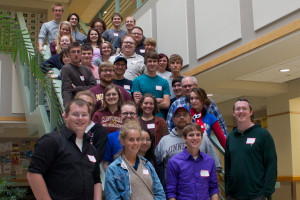
Photo by Noah Keitel.
On Saturday, September 13th, faculty, staff and other volunteers led by student organizers Thomas Harren, Chase Ottomoeller, Alex Widdel, and faculty Elena Machkasova ran their second Open Source Comes to Campus event. They followed up on an amazing first workshop last fall with another successful event! Volunteer mentors Jim Hall and Noah Keitel each wrote blog posts describing the event.
Our group of students and mentors worked and learned together as we went. We were able to get the drone to takeoff, and land by mapping keys to functions in our controller, which in turn called the service which other students had worked on… We were just about to fix a few bugs to get the ARDrone to respond to forward, back, left and right when we ran out of time. But luckily, this is all open source code on github, so we can keep working together to tackle some of these bugs!
With help from Emily, Josh, and Alek, we migrated old web pages into the FreeDOS Wiki. The overall project to convert old content will take weeks or months, and this workshop provided a great kick-off for our documentation clean-up efforts… Daniel refactored the web code for the FreeDOS News page, which also feeds the news items on the FreeDOS website… Other groups provided improvements to a free Senet board game and to a drone control system.
I am proud to have been a mentor for this event. What a great way to help students and to serve the campus! I look forward to next year’s event!
We’re looking forward to it too, Jim!
City College of San Francisco
This September, the CCSF Coders Club held their third Open Source Comes to Campus event, led by rockstar organizer Katherine Moloney. Attendee and photographer Alan Martinez writes:
I learned a little more about GitHub at this event and have gained more confidence in collaborating, forking and cloning a repository, making changes locally and making a pull request. For those that are new to Git or GitHub this is a great workshop.
You can see the pictures that Alan took here!
October
DePaul University
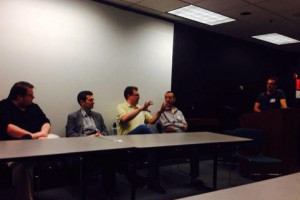
Photo by Shamil Clay
Although this was DePaul University’s first Open Source Comes to Campus event, it was not our first collaboration with Chicago’s wonderful open source community. Several of this event’s volunteers, including lead organizer Sheila Miguez, helped with previous events at UIC and NEIU.
Enthusiastic attendees took to twitter to let us know they were enjoying the event:
Super excited to contribute to #opensource @CDMDePaul‘s #OpenHatch program!! http://t.co/A6hf6bo5Ay #womenintech #computerscience
— Rachel Ramos (@itsrachelle) October 18, 2014
At @CDMDePaul‘s #OpenHatch event! So far we’ve learned about open source from various perspectives! #tech #panel pic.twitter.com/YZ0WKlZlTf
— Shamil (@ShamilClay) October 18, 2014
Had a great time learning about #opensource resources at #openhatch today! Very inspiring. Looking to jump into a project. #DePaul #CDM — Michael Beskin (@mmbeskin) October 18, 2014
Claremont Graduate University
April Moreno and the CGU GIS club put together a great event with an Open GIS theme. They were helped by longtime OpenHatch volunteer Carol Willing, who led the day’s tutorials, PyLadies Los Angeles organizer Esther Nam, who helped teach tutorial breakouts, and Camille Teicheira, who helped students contribute to OpenStreetMap remotely from San Francisco! April writes:
“Attendees were particularly impressed with the local tech community and with the community participation. Inviting external participants turned out to be a great idea.”
Bucknell University
Student organizers Melissa Rios, Li Li, Tung Phan, Colin Heinzmann, Son Pham, and Aleks Antonov are working hard to build an interdisciplinary learning community at Bucknell University. Their hard work as they planned this event made their passion for open source software and foundational technology clear. If you’re an innovator, entrepreneur, or open source aficionado near Lewisburg, PA, get in touch and we can continue to grow a community together.
University of Victoria
At the University of Victoria in October we had two firsts: our first ever non-US event, and our first event focused on a specific project: Mozilla Webmaker. The event was hosted by University of Victoria’s Women in Engineering and Computer Science and Computer Science Course Union, sponsored by Mozilla, and led by Mozilla community builder Emma Irwin.
Emma wrote about her experience:
I was surprised to learn that FOSS contribution is really just ‘skimmed’ over in computer science classes, and so I’m hopeful that events like this can eventually lead to a re-visit of curriculum in higher ed. To that end, I have some personal goals around the Web Literacy Map and running events that focus on contributing to Mozilla. Here are a few of the literacies we covered: Community Participation Collaboration Open Practices Coding/Scripting Infrastructure
Remote volunteer Errietta Kostala also posted:
Technology made giving the talk remotely remarkably easy, and there weren’t many surprises! I started by helping out over Skype: Emma had hooked her screen up in a projector and I could talk and share my screen with Skype’s screen sharing feature. I said a few short words about IRC and then jumped straight into demonstrating how to use a client and get on freenode’s #openhatch and moznet’s #introduction and #webmaker. Later on, students were encouraged to ask any Webmaker questions in the #webmaker channel were me and other contributors could help them out. I answered some of their questions and worked with them and had lots of fun. Overall, it was an awesome day/night both for me and the students, and I certainly hope to see them in #webmaker again contributing and having more questions!
November
Indiana University at Bloomington
Last fall, when we travelled to Bloomington to run our first Open Source Comes to Campus event there, Jessie Pusateri was one of our most enthusiastic students. One year later, she stepped into the shoes of last year’s host Lindsay Kuper and pulled together an amazing event! The growing open source communtiy at IUB plans to continue running Open Source Comes to Campus workshops.
You can see photos from the event here.
Swarthmore College
Swarthmore College’s Women in Computer Science, led by Rachel Stein, Shawn Pan, Jocelyn Adams and Meiri Anto, put together a great first event this fall, with mentors and students coming from around the Philadelphia area. One student enthused:
“In our contributions workshop, we got a chance to talk to a data analyst about his work which was really cool!”
You can see photos from the event here.
Columbia University
The Application Development Initiative, led by Nate Brennand, ran their second Open Source Comes to Campus event in November, following up on a successful event last fall. One student tweeted:
contributed to my first open source project: @OpenGov Project Open Data on @github today thanks to @openhatch & @adicu! — eunice (@eunicekokor) November 15, 2014
Cornell University
Women in Computing at Cornell, led by Jisha Kambo and Susan Chiang, ran their first Open Source Comes to Campus event, a loosely structured three hour event with a mix of tutorials and hacking on projects. One student wrote that he values “the freedom to be creative that comes with open source and learning about how to collaborate with a large community”, while others wrote that they enjoyed “Getting feedback from people moderating projects”, “realizing that Git could be used outside of CS” and “submitting a patch to ruby”. The main critique? Not enough time to work on projects and get to know the amazing mentors. We look forward to fixing that with another, longer event!
Pictures from the event can be viewed here.
Hartnell College
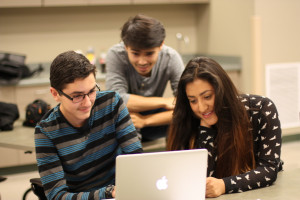
Photo by Asheesh Laroia
Hartnell College ran two events this year, thanks to the expertise and enthusiasm of their Computer Science Education Coordinator, Katie Cunningham. This time, returning students were able to jump right in to contributing, while newcomers went through our series of presentations and hands on activities. More than any individual activity, though, the students really appreciated talking to the volunteer mentors. One student wrote:
“My favorite thing about the event was being able to speak to the mentors and gain insight from them. I enjoyed being able to speak to them and hearing their experiences.”
A few weeks later, Katie arranged a short, casual follow-up event, where mentors helped students follow up with the contributions they’d been work on remotely via IRC. This was a definite success, and we’ll be encouraging other schools to follow Hartnell’s example.
You can see pictures from the event here.
University of Washington
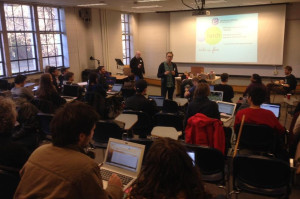
Photo by Jake Vanderplas
Thanks to organizers Ben Marwick, Mako Hill, Ana Malgon, and Allan Ecker, mentors Darius Jazayeri, Jacob Vanderplas, Thomas Levine, Frances Hocutt, Venkatesh Srinivas, Kai Yang, Bryan Newbold, Jonathan Griffin, and to the generous sponsorship of the eScience Institute, the University of Washington boasted a well-attended first Open Source Comes to Campus event this fall.
University of California at Berkeley
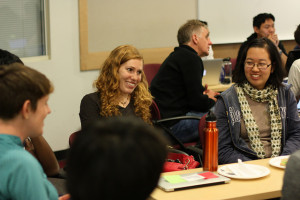
Photo by Asheesh Laroia
Berkeley also ran their first Open Source Comes to Campus event this fall. Organized by James Maa and Alex Yang of Hackers at Berkeley and sponsored by Red Hat, the event drew mentors from all around Berkeley’s vibrant open source community. Featured projects included iPython, Peer Library, Oppia, and BOINC, the software and community behind SETI@Home. You can see photos from the event here.
Baruch College
I went to Baruch College in November to lead a short event similar to last spring’s Stony Brook event. This informal event, pulled together by Kannan Mohan, was smaller but still enthusiastically received, and we’re planning to do another event in the spring.
SUNY Stony Brook
Speaking of Stony Brook, student organizer Hanne Paine ran a follow up event with them this fall. We had difficulty finding enough mentors for the event, and ended up doing a shortened version that focused on a remote career panel and making changes over IRC. We’ll try again in the spring, hopefully at a better time for New York area open source enthusiasts.
Per Scholas
I also visited Per Scholas, at the invitation of organizers Sarah Conte and Jerome Dazzell. Jerome writes:
An amazing opportunity for our software testing class, where students gained a deeper understanding of open source software, projects, products and tools that foster open source collaboration, prototyping and community development.
Students with a programming and non-programming equally benefited from the workshop. Much of the internet is built on many open source technologies and the OpenHatch workshop did a fantastic job of tying it altogether.
Per Scholas’ cohort structure encourages a well-bonded and welcoming community, which in turn fostered a wide-ranging discussion on community norms, learning styles, motivations for contributing to open source, and more. Add to that a whirlwind tour of IRC, issue trackers, and submitting pull requests on github, and it’s no surprise we ran over our short event time slot. We’ll be back at Per Scholas this spring.
Princeton University
Open Source at Princeton’s Katherine Ye, Lisha Ruan, Valerie Morin, Catherine Wu, Diana Liao and Annie Chu followed up on their event last fall with another successful event. With the local Drupal meetup and Two Sigma providing several mentors, there were plenty of projects to work on and a growing open source community at the school for students to become a part of. More than two thirds of students said they planned to continue contributing on the exit survey. One student wrote: “The people were very patient and helpful to me when I would get stuck and they did a great job helping through the processes” while another talked about “the fact that beginners were welcome with a very down to earth approach to GitHub”.
Drupal contributer and mentor at the event, Peter Wolanin, reports that three patches from students were eventually accepted into Drupal core: one, two, and three!
Looking Forward
We can’t wait to return to the schools above. We’ve learned so many lessons from our events this fall, and gotten to participate in so many wonderful open source communities, both fledgling and robust. But we’re also looking forward to going to new schools, too!
Interested in hosting an Open Source Comes to Campus event? Email us at hello@openhatch.org, or suggest an event on our new forums.
Thanks for believing in OpenHatch — here’s our end of year newsletter
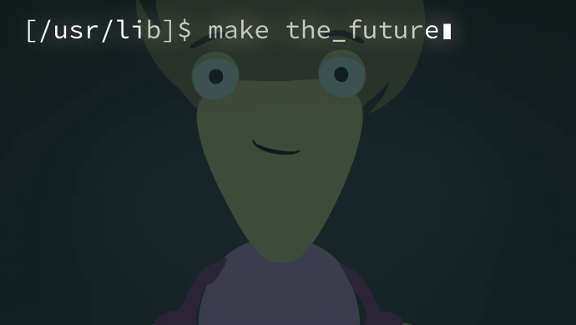
Welcome to OpenHatch newsletter number 28.
OpenHatch didn’t run a campaign-style end-of-year fundraiser this year. Frankly, doing such a campaign excellently requires a huge amount of time from planning through fulfillment; bothering everyone with a campaign just didn’t pass cost/benefit. But we truly appreciate all our individual supporters and corporate sponsors (follow links to join them)! They allowed our one paid staffer (Shauna Gordon-McKeon, program director) to focus exclusively on organizing, improving, and organizing organizers for Open Source Comes to Campus events across the U.S. and Canada. We ran 26 Open Source Comes to Campus events this year, along with several in person sprints and IRC-based sprints, tutorials, and information sessions. OpenHatch was also present at many open source conferences, including SCaLE, LibrePlanet, PyCon, AdaCamp, Open Source Bridge, and the Grace Hopper Celebration of Women in Computing. Look for a wrap up of last year coming soon, as well as news on how we plan to expand in 2015.
Meanwhile we want to highlight three end-of-year campaigns that ought to interest all readers of this newsletter.
First, a matching campaign led by Sumana Harihareswara to support the open source community in Portland, Oregon. That community is already a global leader in showing how open source can be welcoming, diverse…hospitable. Help it be even more of a guiding light. Sumana is NYC-based, so this is truly a strategic investment, not a ploy to get her local community funded. Read Sumana’s post on the OpenHatch blog for details (and note the match has been extended to December 31 at 1:30pm Pacific, which is 21:30 UTC, just a couple hours!).
Second, Software Freedom Conservancy has begun a supporting member program. Conservancy’s executive director, Karen Sandler, has long been a leader in making free and open source software more diverse; expect more of that next year. (Disclosure: your newsletter editor is a Conservancy director.)
Third, the Free Software Foundation is running its annual campaign. Notably they’ve just released a short video which takes its efforts to make the case that software freedom is crucial for everyone to the next level. We can imagine showing this at Open Source Comes to Campus events!
There are of course many other worthy year-end (and ongoing) charitable opportunities, but these are well aligned with the OpenHatch mission. And again, your direct support of OpenHatch is most appreciated. 🙂
Closing with a non-fundraising “inside OpenHatch” read: Your Django Story: Meet Susan Tan, interview with a core committer on the OpenHatch web application.
OpenHatchy but not OpenHatch things around the web
Mozilla Contribution Analysis current findings (slides): “How you respond to interest IS CRITICAL: response time is everything, suggesting work (help start up a ladder of participation) is very helpful“
Mako Hill, Ben Lewis, Frances Hocutt, Jonathan Morgan, Mika Matsuzaki and Tommy Guy ran their second set of Community Data Science Workshops at the University of Washington, to the delight of many.
Mozilla community builder and developer / OpenHatch volunteer Emma Irwin ran Hacking Open Source Participation, an online tutorial based off of Open Source Comes to Campus materials.
Also check out links submitted to /r/openhatch, and add your finds!
Get involved
You can help write this newsletter! The next edition in progress (preview). Join our publicity list or hop on #openhatch with suggestions and questions.
Thanks to Britta Gustafson and Shauna Gordon-McKeon for contributing to this edition!
Please match this $15,000 donation by December 29th!
This is a re-post of a post by Sumana Harihareswara on the Stumptown Syndicate blog.
I’m donating up to $15,000 to the Stumptown Syndicate — depending on how much you are willing to match by December 29th. Please join me by donating today and doubling your impact!
Stumptown Syndicate works to create resilient, radically inclusive tech and maker communities that empower positive change. Open Source Bridge, one of its core programs, is the tech conference that has imprinted itself on my heart — informative technical talks, inspiring ideas that help me improve how I do my work, and belly laughs and great food. I love that I can tell friends “Come to OSB!” without having to add “but watch out for…” the way I do with so many other conferences. Hospitality lives in the DNA of Open Source Bridge, so it’s a place where people from different projects and backgrounds can share their experiences as equals. I especially appreciate that it’s an inclusive all-genders tech conference where I’m never the only woman in the room; in fact, in 2014, half the speakers were women.
Stumptown demonstrates its values before, during, and after OSBridge, and documents them to make a playbook other event planners can reuse. The Syndicate encourages volunteers to help make Open Source Bridge happen (showing appreciation by giving them free access to the conference), encourages them with a reassuring form and clear expectations, and mentors them with structured orientations. The Code of Conduct, accessible venues, clearly labelled food, cheap or free admissions, and open source conferenceware all model effective and ethical collaboration.
But, until now, Stumptown Syndicate hasn’t had the money to host childcare at its events, to offer travel scholarships to OSBridge speakers from other countries, or improve the audiovisual experience (with faster video processing or transcripts/captioning). And it’s had to host its events at borrowed or rented venues, which reduces the Syndicate’s ability to nurture new events and communities; more money in the bank opens the possibility of a more permanent event space.
Still, the Syndicate’s done a lot since its founding in December 2010. Every year, Stumptown Syndicate supports or directly hosts 2-4 events in Portland. Hundreds of participants have grown, personally and professionally, via OSBridge, WhereCampPDX, Ignite Portland, BarCamp Portland, and the user groups it supports. Its work on Calagator keeps the community connected, and its focus on inclusion and diversity has helped everyone in Portland’s tech scene benefit. Including, probably, you, if you’re reading this. And it’s done that with about $110,000 each year, a mix of donations and sponsorships.
With your help, the Syndicate can plan further in advance and make the events you already love even better. And if Stumptown Syndicate volunteers don’t have to worry as much about fundraising, they can concentrate more on revamping Calagator, mentoring newer developers, and enriching Portland’s tech scene — and documenting their successes so people like me can copy them.
That’s why I’m willing to give up to $15,000 to Stumptown Syndicate. I’ll match donations starting today and ending on December 29th, whether corporate or individual, one-time or recurring memberships. Please donate now to help raise $30,000 for the infrastructure of inclusivity!
Stumptown Syndicate is a 501(c)(3) tax-exempt organization. Contributions to Stumptown Syndicate are tax-deductible in the U.S.

